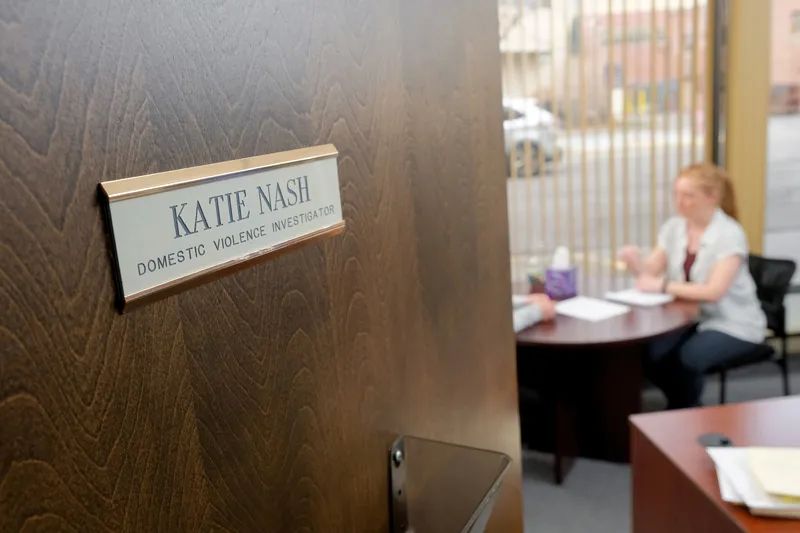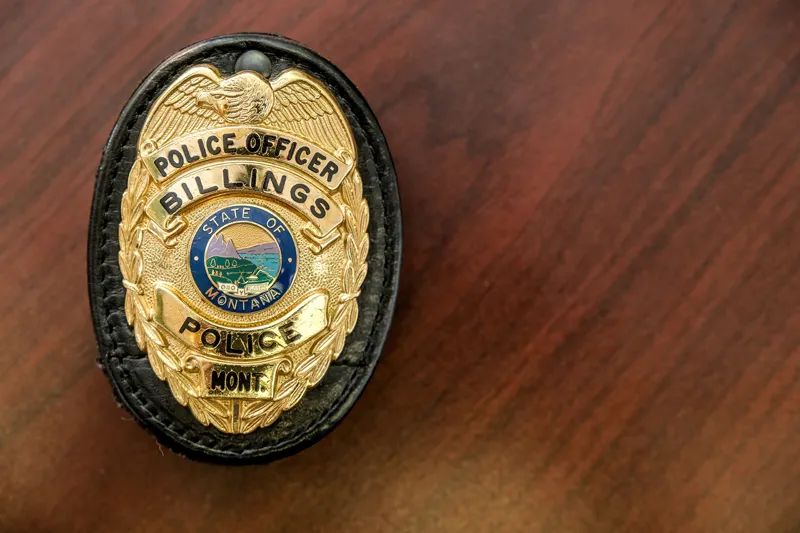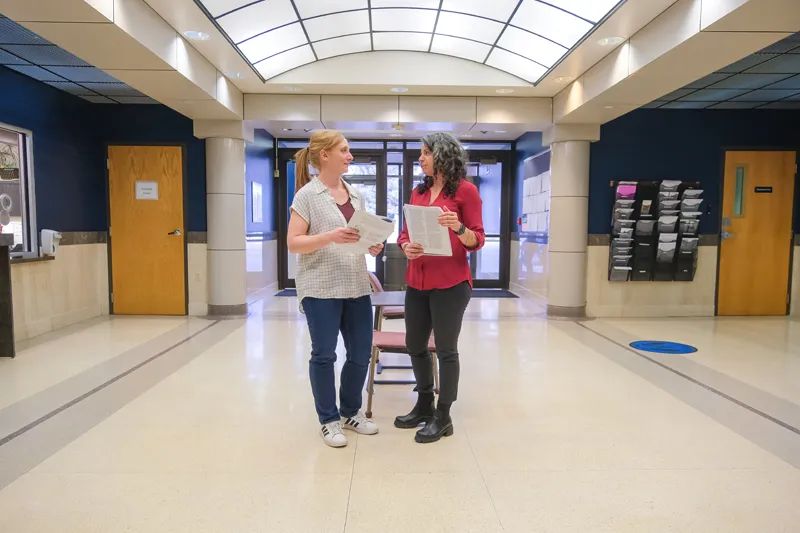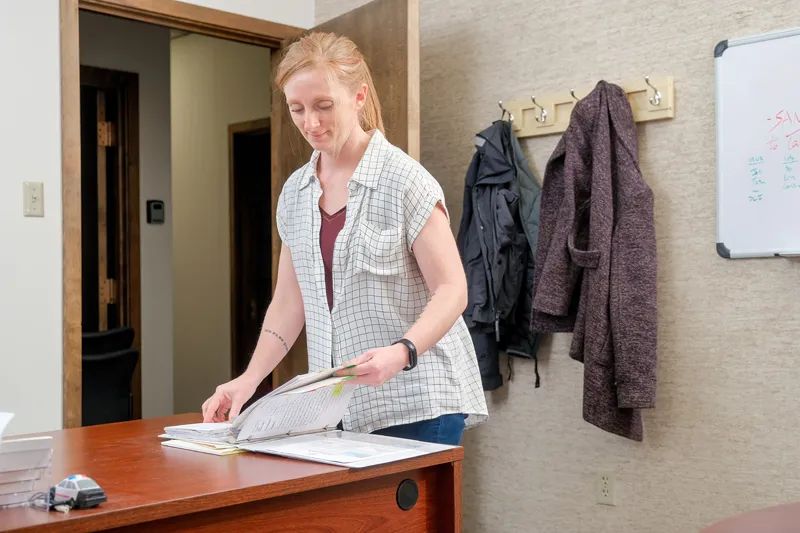
Standing In The Gap
Billings Police Officer spends career fighting for victims of domestic violence
When police go on a domestic violence call, it can quickly turn to chaos. The victim is frightened. The perpetrator is angry. Cuffs come out. Photos are taken. It’s a rush of activity. Officers have a focus — to de-escalate the situation and make any necessary arrests. In the past, a victim would be left alone to pick up the pieces.
Today, victims have a friend in the system. She wears a badge too, but she’s not tied to a police radio. Officer Katie Nash’s sole mission is to listen, lend a hand and make sure justice is served.
“The patrol officers know how to investigate,” Katie says. “They go on scene, arrest the bad guy and then this poor victim and her family are left behind. They have paperwork, but after a trauma, you’re not going to read through five pages trying to figure out what it means.”
For the past 10 years she has been the domestic violence investigator for the Billings Police Department. “I can fill that gap,” she says. “Even though I am law enforcement and not an advocate, I can sit and listen.”
In her role, Katie has not only developed ways to give prosecutor air-tight cases. She has also helped victims get the resources they need to rebuild their lives. She’s helped get new laws to make it easier for victims to find justice, and she’s spearheaded the effort to make Billings the first city in Montana to have a Family Justice Center — a center that puts domestic violence services under one roof. (See story on pg. ___ Northern Lights Family Justice Center).
“I’ve been able to dig into things,” she says.
Back in 2013, the department used grant funding from the Montana Board of Crime Control to jump-start her position. Before that, the city prosecutor’s office used a grant to pay overtime hours so officers could help investigate these cases. The work never seemed to end.
“These cases are so complex and there are so many moving pieces that it’s helpful to have someone who isn’t tied to a patrol radio,” Katie says. “I don’t have to worry about the calls stacking up in my beat. I can get search warrants for phone records. I can listen to jail calls. I can talk to neighbors to try to build a strong case.”
When Katie talks about her job, she’s quick to tell you she’s not a survivor helping survivors. She’s several generations removed from the domestic violence that ran through her own family.

“My great-grandparents had some violence, nothing that personally touched my life,” she says. “I heard stories growing up about how my grandpa would sleep in front of his mom’s bedroom door so his alcoholic dad couldn’t get in.” She has reflected on that from time to time. “I have a 14-year-old son, and to imagine him sleeping in front of my door to protect me blows my mind.”
Her first true brush with domestic violence came in college when she worked at the YWCA shelter in Great Falls. She was an advocate for three years before becoming a police officer. Many nights, the shelter was near or at capacity. She remembers how hard it was to have to let victims walk out the door and potentially go back to their abusers.
“One woman, I think she’d only been in the shelter once,” Katies says. “She came to the shelter with her infant, and when she left and went back to her abuser, he shook the baby and caused brain damage. There was something about that relationship that she couldn’t leave. We couldn’t get her out fast enough for that baby.”
Because of experiences like that, she’s able to better understand the dynamics of domestic violence and why victims make the choices they do.
“That’s what the advocacy role helped me to understand — getting out and staying out maybe isn’t safe right now,” Katie says. “Maybe it is safest to be in and have a game plan. When tensions escalate, you’ll move to this room instead of the kitchen where the knives are. You’ll lock yourself in the bathroom. Having a safety plan — it’s hard to imagine the lesser of two evils to just stay alive.”
Taya Keith knows all about the lesser of two evils. She met Katie in 2016 when she was trying to escape her abusive marriage. After being married for 18 years to her high school sweetheart, she realized how trapped she’d become.
“I had everything in the world that should have made me happy — kids, a house and horses — and instead, I wanted to die,” Taya says. “Even though physical things weren’t done, words were said like, ‘If I can’t have you, no one can.’ He’d break things and throw things, just because he was angry.”
In time, she confided in friends. She started to stand up for herself. And he started to push back. When her husband suspected she was trying to leave, Taya says, he went to the bank to pull all the money out of their account. When she unknowingly arrived at the bank at the same time, things got heated in the parking lot and he struck her in the face before peeling out in his truck. He was charged with partner or family member assault. A protective order was filed against him.
Ben Halvorsen, the city attorney who handles domestic violence cases, ended up calling her afterward.

“He said this sounds like it is escalating and getting worse,” Taya says. “It reminded him of a case he helped with where a woman was shot by her ex-boyfriend. I remember saying, ‘Not there yet, Ben. I appreciate you taking it seriously but…’”
Taya says her husband broke the restraining order daily, stalking her and harassing her. He’d smash windows and slash her tires.
“It was overwhelming,” she says. “Things were starting to catch up with him and he was starting to face real jail time.”
It all came to a head when Taya was walking into a downtown grocery store. “He had followed me there from work. He ran through the parking lot with an AR-15 rifle pointed at me. It was the scariest thing to look up and see him running toward me.”
She managed to jump in her vehicle and drove straight to the Sheriff’s Office. Sometime shortly after, Ben called her again and told her to pick up her kids from the Boys and Girls Club, and under no circumstances was she to go home. He told her to check into a hotel and not tell anyone where she was.
When officers couldn’t find the rifle used, Katie brought recorded jailhouse phone calls for Taya to listen to. One was a cryptic message between her husband and his brother about the gun.
“She played the recording and said, “It sounds like they are talking in code. Do you know where this is?’ I said, ‘I know exactly where that is. That’s underneath my house,’” Taya says. “She went under the house and he had a bunch of stuff under there with the gun — a candle and a sleeping bag. You can tell he stayed the night at least once.” Taya says she can’t bring herself to really think about what might have happened if she had never talked to Ben and instead had gone home after the incident.
“I don’t think we would be alive. I really don’t,” Taya says. “I think he would have killed us and then himself. For Ben to tell me not to go home, I know that saved us.”
Her husband was sentenced to eight years in prison for a combination of offenses against her. Taya is forever grateful that she had Katie to lean on while the whole case was being prosecuted.
“She was such a good sounding board. She just laid out the facts. She didn’t sugar coat anything but was still soft about it,” Taya says. “Her strength, her compassion — I absolutely adore her in every way.”
Since then, Taya became a voice for survivors in the effort to start the Family Justice Center. In February, she was named coordinator of the new center. Now, instead of being served by both Ben and Katie, she’s working right alongside them.

“I don’t know how else to describe it other than a beautiful situation that I am going to be part of,” Taya says. “I can work with these people that made such an impact on my life during such a dark time.”
The idea of a Family Justice Center came about when Katie learned about the concept at national conferences and training sessions. She says she tries to stay current because otherwise, “It’s just me doing reactive police work and doing the follow-up investigations.”
If you ask prosecutor Ben Halverson, Katie’s work has been anything but reactive.
“It’s hard and it’s a unique challenge to come in every day and open your heart and open your mind and have the patience and compassion to work one on one with victims and try to get them out of these abusive relationships,” Ben says. “Katie’s ability to connect with victims and her willingness to thoroughly investigate cases from top to bottom — there’s nobody better in all of BPD.”
He admits he’s learned a lot from watching Katie in action.
“She has an ability to see on the ground what the deficiencies are,” he says. She was the one who came to him asking for a change in state law to make strangulation cases a stand-alone felony. Before the change, the law stated a victim needed to verbalize that she felt her life was in danger before an abuser could be charged with aggravated assault.
“It was a constant problem that these cases just weren’t being prosecuted,” Ben says. “It was enraging to me that someone could get away with picking a victim up by the neck, pinning her against a wall and if there were no injuries, that would be a misdemeanor? That’s absurd. It’s a complete failure of justice.”
In addition to the change in the law, Katie is now working with both Billings hospitals to get forensically trained nurses to do strangulation exams. She hopes it will strengthen cases and bring about more convictions. She also fought to arm officers with an assessment they can use on the scene of all domestic violence cases.
“She’s the one who got the ball rolling and showed prosecutors and judges that this works,” Ben says. “It’s indicative of who the worst of the worst abusers are. That wouldn’t have happened without her.”
“It’s not just what this dude did on this particular day,” Ben explains. “It’s how he is all day, every day. Controlling finances isn’t a crime. Owning a firearm isn’t necessarily a crime. Being jealous isn’t a crime, but the more of these factors that are checked off, the more likely it is that this person is at serious risk of re-assault or even homicide.”
He adds that once those assessments are complete, the officer can offer a direct call to the YWCA emergency line.

One of the biggest challenges with domestic violence cases is that victims are not always willing participants in the criminal justice system.
Sgt. Shane Winden is Katie’s supervisor. It never ceases to amaze him that instead of being burnt out on the work, she thrives on working with victims, even if they want nothing to do with her.
“It takes a special kind of person like Katie to understand psychologically what is going on and to continue to dive in and fight it,” Shane says. While a victim might be eager to put her abuser behind bars the night of an attack, he adds, “Within a couple of days, people’s attitudes start to change and victims don’t want to be victims anymore. This is my marriage. We have kids together. I can’t afford to live on my own. I am not willing to help the prosecution despite the fact that I can’t see out of my left eye.”
Katie remembers one victim in particular who she says when they first met, she was public enemy number one.
“Just last Christmas, it wasn’t the first time she had to call 9-1-1. It was scary, scary abuse,” Katie says. The woman suffered physical beatings often in the middle of the night. “I don’t know what would trigger him, but he would wake up in a rage and just start beating her.”
When Katie met the woman, she was enraged.
“I let her yell at me, that was fine,” Katie says. Her abuser stayed in jail, and while Katie worked through the case with the woman, she was able to reconnect with her adult children. “They told her, ‘Mom, we stayed away because of him and now that he is out of your life, we will be your support system.’ She stayed in text contact with me. She was able to spend the last holiday with her family. She wanted to know if I had a good holiday.”
When Katie began her role, she was the city’s only domestic violence investigator. Two years ago, the police department moved Detective John Tate over to help her. The city prosecutor’s office has also added two more domestic violence prosecutors and additional victim-witness specialists.
“There are more of us now who are pushing the same message,” Ben Halvorsen says. “She started that battle and others of us have jumped on the train, but her voice leads the way.”
If Katie had one thing she’d want the community to know, it’s this. There are people here willing to help.
“You don’t have to wait for something horrible to happen,” Katie says. “There are people within the police department that you can just come talk to and say, ‘I don’t know what to do.’ That’s something that I have accomplished.”











